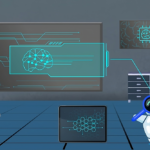In a year-end report, Chief Justice John Roberts of the United States cautioned about the potential of technology to “dehumanize” the legal system, emphasizing the significant increase in artificial intelligence in 2023. He highlighted that while advocates of AI praise its capacity to improve access to justice, especially for economically disadvantaged plaintiffs, there are apprehensions regarding its implications for privacy rights and the dehumanization of legal processes.
Roberts emphasized the rising prevalence of AI across various technologies such as smart TVs, voice recognition applications, and smartphones, noting the keen interest and vigilance of law professors in this emerging technological landscape. His analysis primarily centered on how AI could enhance the accessibility of legal procedures, particularly for individuals lacking the means for legal representation.
The Chief Justice noted that AI could aid those lacking legal counsel by facilitating the creation of user-friendly tools offering guidance on legal forms, templates, and court procedures from the convenience of one’s home. While recognizing AI’s potential to bridge the gap between available resources and the immediate requirements of the judicial system, he underscored the significance of employing AI prudently and ethically.
Roberts also drew attention to the limitations of AI, including instances of hallucinations where AI systems produce false information, resulting in tangible consequences. He cited a case involving former Fugees member Pras Michel, whose legal team sought a new trial citing alleged misinformation generated by conceptual AI utilized by the previous legal counsel.
In response to the issue of AI hallucinations, several AI developers have invested in technologies to mitigate such risks. OpenAI announced improvements to ChatGPT to enhance problem-solving capabilities, while SingularityNET and Fetch AI collaborated to utilize distributed technology for minimizing AI illusions.
Furthermore, Roberts raised concerns about potential biases ingrained in AI algorithms that could adversely impact court decisions. He highlighted the use of AI in criminal cases to evaluate flight risk, prospects of rehabilitation, and other subjective judgments, shedding light on the ongoing discourse surrounding due process, reliability, and equity in AI-supported decision-making.
Despite these challenges, Roberts expressed certainty that human judges would not be supplanted by AI in the immediate future. Nevertheless, he anticipated a substantial influence of AI on administrative tasks, particularly at the trial level, which could redefine how judges approach their duties and interpret the role of AI in legal proceedings.






